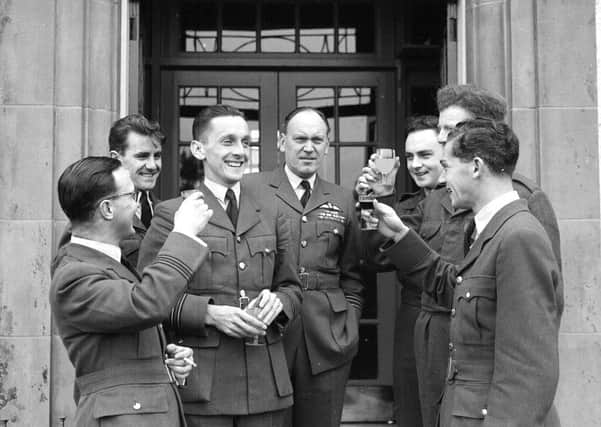Obituary: Joe McGhee, Champion runner


That he should be remembered for just one race which he won because another competitor desperately failed to complete the course is very unfair to Joe McGhee, Commonwealth gold medal winner in 1954 and Scottish marathon champion three times in succession.
For though slight in build, McGhee was a giant of running during the golden age of Scottish road racing, and his feats were impressive before and after he won the marathon at the British Empire Games, as they were then called, in Vancouver, Canada, on 7 August, 1954.
Advertisement
Hide AdAdvertisement
Hide AdThat race will always be recalled for the heroic failure of Jim Peters of England, who was 16 minutes or more ahead of McGhee as he entered the stadium on a blisteringly hot day. A crowd of 37,000 who had just watched the famous “Miracle Mile” race won by Roger Bannister over John Landy watched in horror as Peters was overcome by exhaustion and stumbled and staggered on the track before collapsing some 200 yards short of the finishing line.
McGhee’s own ambition for the race was simply to last the distance in the heat, and he revealed years later that friends and colleagues had worked wonders to keep him supplied with water and encouragement throughout the race.
Learning of events up ahead from them, McGhee had thought for some time in the race that he was destined to be second, and had continued to run conservatively, but as he entered the stadium, Scottish team captain Dr Euan Douglas gesticulated wildly that he was going to win, and McGhee duly became the youngest-ever Commonwealth Games marathon gold medallist, though it is Peters’s collapse that is always associated with the race.
Born in Camelon near Falkirk as one of three children of William McGhee, who worked at ICI in Grangemouth, and Jane, the young McGhee was a bright boy – he was dux at his local RC primary school – and showed his running prowess from an early age. Encouraged by his father, McGhee was a champion runner all through his teenage years, and then at Glasgow University, where he began his MA degree in 1946. His achievements included medal-winning performances at the Scottish Universities’ Cross Country Championships, leading Glasgow to team gold, and selection for the Scottish Universities’ cross-country team during every year of his studies.
He was awarded Full Blues in 1948 and became captain of the university’s famous Hares and Hounds club in 1949-50. Prolonging his studies to take the Bachelor of Education degree necessary for a teaching career, McGhee graduated finally in 1951.
He began teaching at St Modan’s High School in Stirling and joined the local athletics club, St Modan’s AAC, for whom he placed third in the Scottish marathon championship in 1953.
He would go on to win the marathon title in 1954, 1955 and 1956 – the first man ever to achieve that feat.
By then McGhee was being coached by Alan Scally at Shettleston Harriers, and had also been called up for National Service. He served as a Flight Lieutenant at Turnhouse, Edinburgh, and later he always credited his time in the RAF and his move to the Shettleston club as the developments which enabled him to improve to win the gold medal in 1954.
Advertisement
Hide AdAdvertisement
Hide AdThe Vancouver marathon win brought him fame at home, McGhee later recalling: “The victory ceremony as the Scottish flag was raised will remain an unforgettable memory. It was also a fairy tale ending for the Scottish team to win our first athletics gold just as the Games were closing.”
The following season McGhee set a new native record of 2hrs 25m 50secs in retaining his Scottish marathon title, and was hailed as having proved that the gold medal was no fluke. Indeed, that time was the fastest for any Briton in the 1955 season – but still failed to win him a British vest. He did, however, win the prestigious Donald McNab Robertson Trophy for Scotland’s best road runner from 1953 to 1956.
McGhee was offered but declined a commission in the RAF and went back to teaching at St Modan’s. He continued running for a brief while, but surgery on a troublesome back effectively halted his career as a top-class runner.
He married Margaret Law, also a teacher, in 1960 and the couple set up home in Edinburgh when McGhee moved to become head of English at St David’s High School in Dalkeith. They had five children in all, Joseph, Louise, Gillian, Pauline and Clare.
In 1965, the family moved to Aberdeen when McGhee became head of linguistics at Aberdeen College of Education. It was a highly responsible job at which McGhee thrived.
A modest man, McGhee nevertheless felt he didn’t get the recognition his marathon wins deserved, especially the 1954 gold medal, and he gave up athletics until he started running again in the 1970s, doing some coaching in and around Aberdeen. He continued running, then jogging until 1995 when knee injuries finally reduced him to walking pace.
In 1996, the organisers of the London Marathon planned what turned out to be an emotional reunion between McGhee and Peters. The latter had been given a special gold medal by the Duke of Edinburgh after the Vancouver Games, but it had been stolen – McGhee duly offered him his own, though Peters politely declined.
Living in Edinburgh in retirement, McGhee suffered an aneurysm eight years ago and also had his knees replaced, but though the aneurysm continued to trouble him, he remained active and fit until almost the end of his life.
Advertisement
Hide AdAdvertisement
Hide AdSadly, his wife Margaret suffered a massive stroke several weeks ago, and McGhee’s own health took a sudden turn for the worse, before he passed away in the Royal Infirmary of Edinburgh. He is survived by Margaret and his five children and six grandchildren.